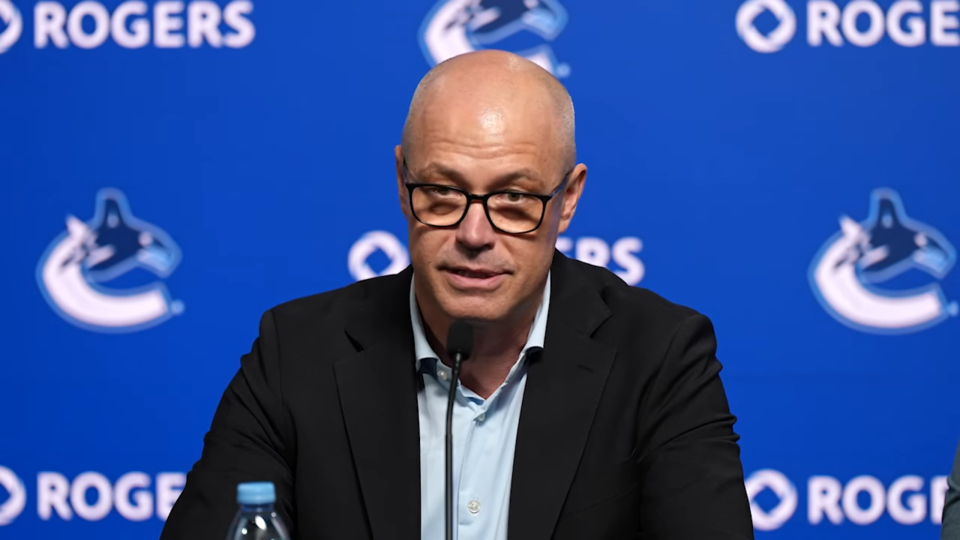When the Vancouver Canucks take to the ice Wednesday to open their 2024-25 season they will be, like all modern sports franchises, an exercise in excruciating financial manoeuvring up to the last few days before the puck drops.
A major-league franchise these days is a shrewdly assembled pecuniary equivalent of a wardrobe, with pieces for every conceivable function: the fancier, the everyday and the grittier, all within a defined and unbreachable budget. This year’s team clothes closet maxes out at US$88 million, which sounds nice but is barely enough to be seen and appreciated in public. Savvy behind-the-scenes leadership tries to save some dough to spend later in the year on a couple of splashy additions for the big show.
Long gone are the days of building around the homegrown stars – if that were the case, Connor Bedard and Macklin Celebrini, the two most recent No. 1 draft choices, would be getting homecooked meals each night on the North Shore instead of their mandated homes of Chicago and San Jose.
Instead, the Canucks and their counterparts in the National Hockey League are global aggregates of more affordable early-career draft choices, varying-priced mid-career acquisitions, and a clutch of later-career hired guns and gap fillers through free (but hardly cost-free) agency.
Each season is a musical chair moveable feast, and success depends on the intrinsic wisdom and accounting wizardry of the staff and executives who attract, retain and part ways rather bloodlessly – it’s a business, after all – with dozens of players each year in the big league as franchise cornerstones and the minor leagues as ready reserves.
Again, long gone are the days of long-term fan affiliation with a player. An eight-year contract, the maximum, is the preserve of the true stars – and even they can change cities, even when their contracts stipulate they can’t be traded. Old-style hockey cards are like today’s daily newspaper: nostalgic in nature, but the lineup is better chronicled digitally to keep track of who is where and when.
The Canucks have been out of the conversation as Stanley Cup contenders for nearly a dozen years, and much had to do with the front-office failures to restock what had been a team with stars and a worthy supporting cast. It has been a downer on the province’s mood as March and April became May and June.
The Aquilini family has not failed for trying as owners, but only recently has it struck on what appears to be an executive combination of substance and ingenuity. Its president, Jim Rutherford, is a vital septuagenarian giving hope to those of us who balk at retirement, and his general manager and coach, Patrik Allvin and Rick Tocchet, were considered among the league’s best exemplars in their roles last season.
And it was quite a season – far, far exceeding expectations, falling in the playoff’s second round by one goal in the seventh game to the Edmonton Oilers who feature two of the world’s best players, Conor McDavid and Leon Draisaitl, and who in turn lost in the seventh game of the Cup finals to the Florida Panthers. It was the closest any team had come to repatriating the Cup to Canada since the Montreal Canadiens last did it in 1993. I guess the Cup in Florida and Tampa Bay three of the last five years is for the snowbirds, but it is certainly for the birds.
Much as I grew up in Toronto, where annual predictions of a Maple Leafs resurgence and recapturing of the Cup over the last half-century have been about as reliable as my lottery numbers, the Canucks and Oilers pose the best probabilities at the moment.
Let’s forget the Albertans for now and focus on the British Columbians – or, more precisely, the international sports millionaire tourists on its 23-man roster who play here. Up front, on defence and in net the team has marquee talent. But it’s the next-level and the next-level-after depth that is the team’s emergent signature, and that requires an almost intergalactic nose for talent.
Allvin, in particular, has taken the team down to the studs over his two-and-a-half years and inserted more speed, more size and more material optimism. He engineered an absolutely brilliant trade last weekend to shed an injured player in exchange for one who could play (but was promptly ditched to Abbotsford in the minors), signed a budding front-line forward to a contract extension, and saved the team a couple of million to accumulate over the course of the season to spend before terribly long if Allvin wants again to be all-in. He was otherwise risking the loss of a couple of roster players to other teams because of a budget overage – if only our governments could learn this technique.
Tocchet is a coach who, one would think, no one would dare cross while in his employ, and he has pretty much driven the athletes into a work ethic in which they don’t bear a butter pad of fat. Again, it’s a business, and there are almost always replacements if you decide suddenly to have fries with that.
But until now, the Canucks had mediocre men to step in. And, with the strength and nutritional and sleep and mental health specialists that the Aquilini’s appear to spare no expense to supply, this could be a great season for the business. Oh, and for hockey.
In sport, hope springs eternal; this year, hope springs feasible.
Kirk LaPointe is a Glacier Media columnist with an extensive background in journalism.




